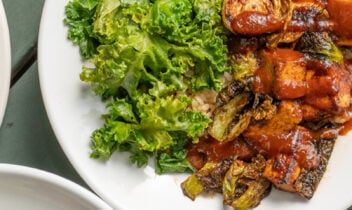
What Behavioral Science Has To Say About Food & Mood
Many lines of research show associations between healthy eating and well-being. For example, depression is associated with obesity. But also, more positively, healthy eating, including the consumption of fruits and vegetables is associated with higher levels of general happiness.
It is useful to understand the relationships between fruits & vegetables and happiness (or mood) from two vantage points: how fruit and vegetable consumption might lead to better mood, and how better mood might lead to fruit and vegetable consumption.
How might fruit and vegetable consumption lead to better a mood?
Fruits and vegetables are associated with better health outcomes. Better health outcomes can be associated with happiness. Therefore, fruit and vegetable consumption has at least an indirect effect on happiness (through improved health).
But fruit and vegetable consumption can have direct effects on happiness as well, most obviously through enjoyment of the taste, but also through the shared experience of eating foods widely known to be healthy.
Eating foods we know to be healthy can lead to a positive emotions like pride. It can also support feelings of increased self-esteem, especially if the fruit and vegetable consumption can replace some “guilty” food experiences. This is, of course, more powerful if the fruit and vegetable consumption is part of a habit or routine and really becomes part of one’s identity.
Psychologists Mike Norton and Liz Dunn argue that happiness is more readily built through social experience than through material reward. Many social experiences can be built through fruit and vegetable consumption. For example, preparing healthy foods for loved ones can be deeply satisfying. Sharing foods that have rich historical and cultural traditions can reinforce the experience of familial and social affiliation.
Sharing fruit and vegetable experiences can also lead to positive mood through public recognition. Receiving “likes” or praise on healthy-consumption-based social media posts can be a source of pride and joy. In an earlier piece, we shared some examples of post concepts (along with actual in-use hashtags). Two of my favorites are:
- Kids helping parents cook with fruits and veggies. #VeggieChef
- Family dinner, featuring veggies first. #VeggiesFirst #VeggieAppetizer
How might a better mood lead to more fruit and vegetable consumption?
Many aspects of mood can influence consumption choices. This has implications for how consumers, caregivers, influencers, and marketers should think about the timing of their efforts. We should ask questions like “when will people be in the mood for fruits and vegetables?” While there are few studies directly focused on that question, we can make some suggestions based on a broader set of research.
It may be possible to use mood to help kickstart and support fruit and vegetable consumption. Research on the fresh start effect suggests that people are more likely to initiate goal-directed behavior (like healthy eating) on the first day of the year, month, and week, as well as other special days like birthdays.
The motivational boost at these times seems to originate from a tendency to think about our best selves, rather than our past selves. This isn’t necessarily a “happy” mood, but it does seem there is a feeling of inspiration and optimism that makes people a little more motivated to reach their goals. Since most people believe they should eat more fruits and vegetables, these fresh start moments may be opportunities to kickstart new consumption behaviors and habits.
In terms of habits, there is a great deal of research suggesting that they form over time and with repetition, generally in the same context, and when reinforced with reward. Parents can support good habits in their children by providing positive emotional rewards when positive behaviors are demonstrated. So, celebrate when kids eat fruits and vegetables! Celebrate loud and celebrate often! The rewards of pride and happiness this can instill in children will make them more likely to repeat the desired behavior next time.
Positive moods, like pride, make perseverance in goal-directed behavior like eating fruits and vegetables more likely. Pride makes us want to keep doing the right thing. So, it may be easier to help kids persevere during “taste challenges” when everyone is in a good mood.
Positive moods are also associated with higher levels of impulse control. We’ve all heard the term “comfort food”, and it rarely refers to healthy snacks. A good mood can eliminate our need for “comfort food” and thus help us resist our impulse to choose indulgent, high-calorie comfort food, and select healthier fruits and vegetables instead.
Conclusion
Fruits and vegetables can lift our mood. And an elevated mood can lead to more fruit and vegetable consumption. Messaging and marketing strategies aimed at positively impacting fruit and vegetable consumption may, thus, benefit from positive emotional associations and images. Specifically, efforts to cultivate increased fruit and vegetable consumption among children should be infused with positivity, celebration of success, and encouragement. Pride in fruit and vegetable consumption can be nurtured among children and adults alike. Fruits and veggies really are Foods Rooted In A Better Mood®.


